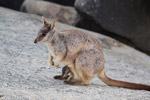
Ariel view of the Great Barrier Reff. Photo by: Rhett A. Butler.
A consortium of companies—North Queensland Bulk Ports, GVK Hancock and Adani Group—have announced they are giving up on a hugely-controversial plan to dump five million tonnes of dredged sediment in the Great Barrier Reef. The plans ran into considerable opposition from environment, conservation, and tourism groups who feared harm to the world’s largest coral reef system, which is already suffering from global warming, ocean acidification, pollution, and overfishing.
The plan to dump the dredge in the reef was approved by the Australian government in January, but has become a significant political issue since then.
The Queensland Senator with Australia’s Green Party, Larissa Waters, called the turnaround a “huge win.”
Yet, the dredge will still have to go somewhere. At this point, the companies haven’t made alternative plans public, but they are likely to be land-based.
The dredged sediment will come from a massive expansion of the Abbot Point coal terminal as Australia works to ramp up exports of coal to places like India. The government recently approved the country’s largest coal mine, the Carmichael mine, which is expected to produce 60 million tonnes of coal annually for export.
“The environmental problems of increased shipping through the reef and the export of millions of tonnes of coal to exacerbate climate change would remain,” Waters told the Australian Financial Review.
Coal is the most carbon intensive energy source on the planet. While scientists have warned for decades that countries must wean themselves quickly off coal in order to avoid catastrophic climate change, coal consumption worldwide continues to rise.
This is not the first environmental controversy under Australia’s year-old government under Liberal Tony Abbott. The government has also been criticized for killing its nascent carbon tax; undercutting international climate change negotiations; attempting to open up a World Heritage Site to logging; and slashing environmental regulations, laws, and funding.
Related articles
Scientists ask Australia to strengthen, not weaken, protection for Great Barrier Reef
(07/24/2014) A convening of nearly 600 tropical biologists and conservation scientists has called upon the Australian government to strengthen protection of the Australia’s Great Barrier Reef. The declaration, issued at the annual meeting of the Association for Tropical Biology and Conservation (ATBC), comes as Prime Minister Tony Abbott pushes to allow industrial dumping in the Great Barrier Reef Marine Park as well as port development in a nearby coastal area.
Scientists blast Australian government’s moves to dismantle environmental protections

(07/22/2014) On Tuesday a prominent group of conservation scientists condemned the Australian government’s recent moves to eliminate protections for native ecosystems, cut research funding, backtrack on commitments to reduce greenhouse gas emissions, and step up persecution of individuals and organizations that speak out for the environment.
Two years after coming into effect, Australia kills carbon tax
(07/17/2014) In a significant victory for Prime Minister Tony Abbott, the Australian Senate has voted to repeal the country’s two-year-old carbon tax. Abbott made dismantling the tax one of the cornerstones of his campaign last September even as Australia remains one of the highest carbon emitters per capita in the industrialized world.
World Heritage Committee takes ten minutes to reject Australia’s bid to strip forests of protection
(06/23/2014) The UNESCO World Heritage Committee today unanimously rejected a controversial proposal by the Australian government to strip 74,000 hectares of temperate rainforest from a World Heritage Site in Tasmania. In an embarrassing setback for the Australia government, it took the committee less than ten minutes to unanimously reject the proposal.
Australia sees rise in greenwashing front groups
(06/13/2014) Australia is seeing a rise in groups that purport to champion environmental causes but are actually actively undermining them as front organizations for industrial interests, argues an op-ed published in The Ecologist.
Australia proposes banning environmental boycotts
(04/07/2014) What do you do when a company is repeatedly caught trashing the environment and refuses to change its ways? Boycott! Activists and campaigners often use boycotting a company’s products when other methods have failed, yet in Australia such boycotts could soon become illegal.
Scientists blast Australian leader’s proposed ban on parks

(03/05/2014) A group of prominent scientists have blasted Australian Prime Minister Tony Abbott’s pledge to oppose the creation of any new protected areas in Australia. The Alliance of Leading Environmental Researchers and Thinkers or ALERT, a coalition of conservation scientists, said Abbott is sending the wrong message to the world in promoting industrial logging over protection of the country’s native forests.







